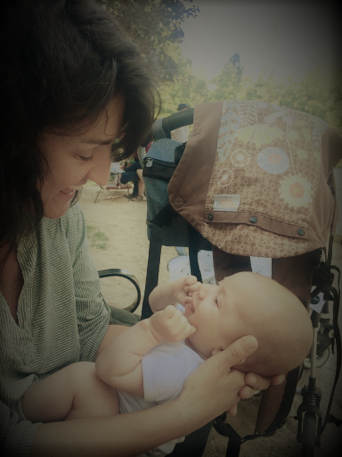 By Ibone Olza, MD, PhD, perinatal psychiatrist
By Ibone Olza, MD, PhD, perinatal psychiatrist
Babies feel, listen, perceive, know, understand, are moved, express, communicate. Babies love. They give. Give smiles, caresses, gazes, babbles. They gift us. They move us. They fill us. Babies are a transforming presence for those that love, care, and live with them.
However, the modern world denies newborn capacities in a brutal way.
Generally, they are (mis) treated as if they were clueless of the world around them and as if they were going to remember nothing of what happens. But this is not so. What happens to us as babies remains in our memory even though it is not recorded in the form of words. They are pre-verbal memories, and precisely for that reason, they are recorded in our body. We all carry, imprinted in our body and our skin, memories of when we were babies.
Babies perceive the emotions of those around them. They know if their caregiver is happy, confident, sad, or stressed. That is why I believe it is so important, when I speak to coworkers – pediatricians, midwives, nurses, I beg them to speak with the babies. Explain to them, just like they do to any other patient; don´t speak only to the parents; speak directly to the child too. But, of course, we must know how to do so.
Baby time is slow. First, we must know how to listen: without hurrying, in silence, with our full attention. Babies, like everyone else, need to know what is going to happen to them, especially if they are separated from their mother o if their needs cannot, at the moment, be met. It is crucial to warn them about what is going to occur, explain the next steps or procedures.
A proposal for sensitive, respectful communication from medical and nursing staff to infants must include:
- Greet, present myself, honor the infant: “Hello baby (name)! I am here, I am listening, and if you´d like, I will explain.” Or better yet: “Hello baby (name)! I recognize you, I know why you are and where you come from, I recognize your presence, welcome! I am glad to be here with you now”
- Take your time, anticipate, so they can prepare. For example: “I have to take a good look at you. I will do so right here, next to mother and father, they will take off your clothes so I can see how you are. It won’t take long, and then you will be back in mother´s arms.”
- Eye contact: respect it. Often babies are so overwhelmed by perceptions that they do not make eye contact, in order to process information or to protect themselves from sensory overstimulation. If they are traumatized (for example by the birth) it may take them longer to make eye contact, or they might not make it with certain people. In these cases, you can tell them something like: “I see you are looking away, I would like you to know that I am here, whenever you are ready.” or “I understand, you do not have to make me happy, I am here in case you need me.”
- Say farewell, always. In maternity or pediatric wards, do not leave the room if the infant is crying and the parents do not react by consoling the child; encourage them to help their infant, pointing out or naming everything they do well.
Babies need time. Learning to listen to them means to offer our presence. There are classical schools that teach how to observe babies, and wonderful professionals adept at listening (like my beloved María Emilia Dip). I learn from all these resources, and I believe that listening to babies is a deeply revolutionary act. Or at least, the one I chose. Specially now a days.
Namasté baby! (I recognize the divine in you!)







